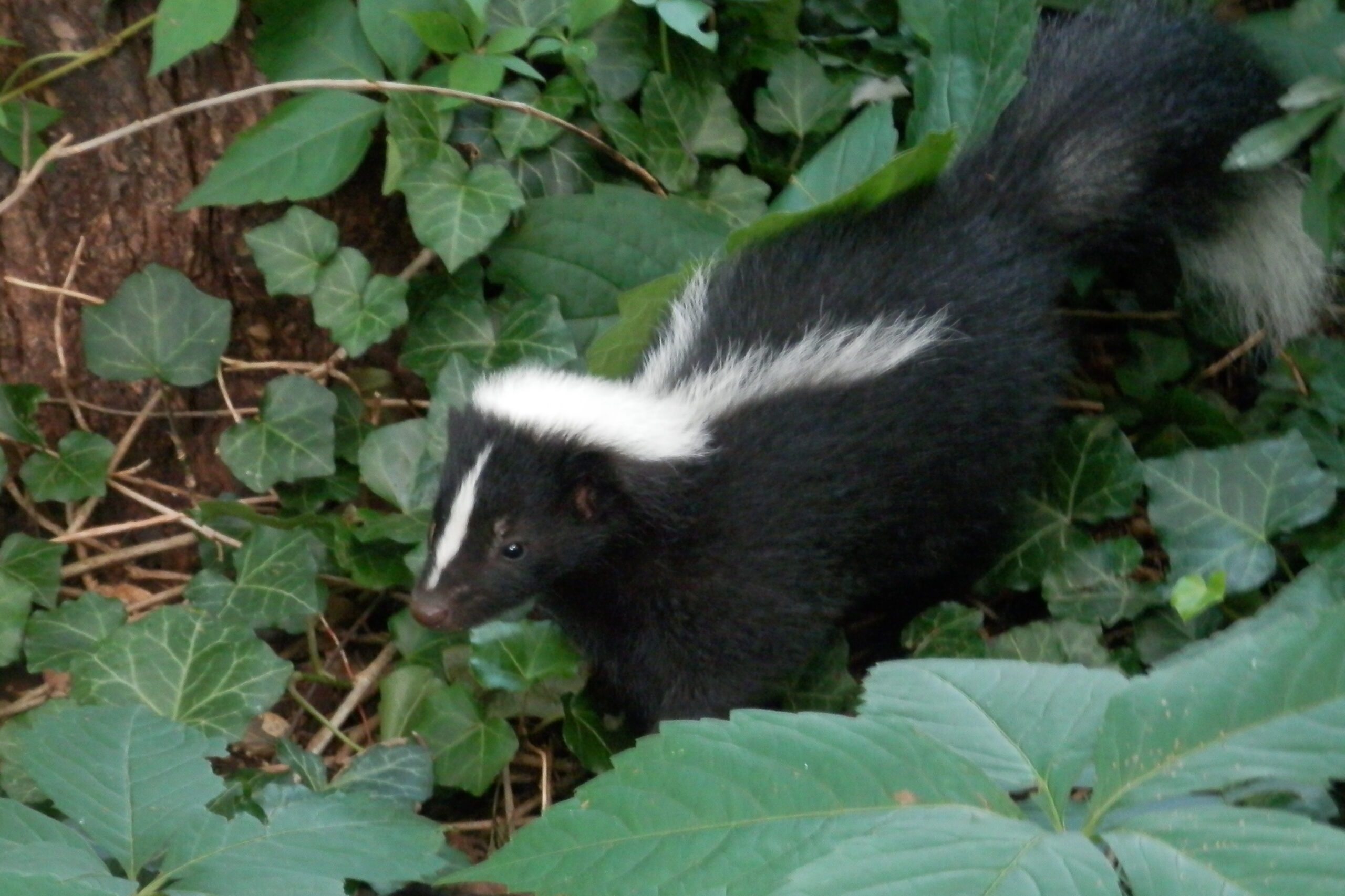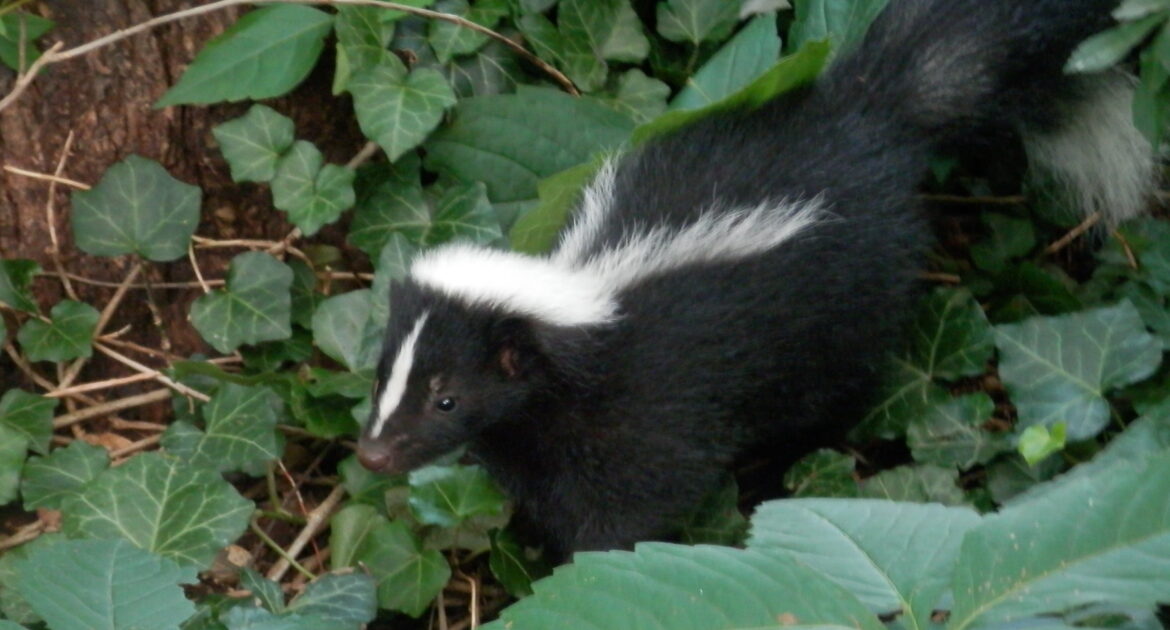If you’ve ever encountered a skunk up close, you’ve likely had questions about their behaviour—especially about their infamous spray. Skunks are fascinating animals with habits and instincts that help them survive in the wild and adapt to urban areas.
Understanding skunks, including why skunks spray and how they behave, can help reduce conflicts and make coexisting with them possible. At Skedaddle Humane Wildlife Control in Etobicoke, we’ve seen just how much understanding skunk behaviour can make a difference in managing these unique animals.
From their nocturnal habits to their curious diets and social instincts, skunks do the things they do for specific reasons. Knowing what drives their actions can help you avoid unpleasant surprises and keep them from making your property their home.
Let’s take an in-depth look at why skunks act the way they do and how professionals like us can step in when necessary.
What Makes Skunks Tick?
Skunk behaviour revolves around survival. They need food, a safe place to rest, and protection from predators. These needs shape many of their habits, and when you understand them, it’s easier to predict a skunk’s actions and reduce the chances of unwanted encounters.
Feeding Habits
Skunks are omnivores, which means they eat both plants and animals. Their diets shift with the seasons, and they’re opportunistic eaters:
- Spring and Summer: Skunks feast on insects like grubs and beetles. They’re often seen digging small holes in lawns while searching for these tasty treats.
- Fall: They focus on building up fat reserves, so they’ll eat fruits, nuts, and whatever else is readily available.
- Winter: While skunks don’t hibernate fully, they rest more during the cold months. When active, they rely on the food they’ve stored or scavenge for scraps.
Their excellent sense of smell helps them locate food, which sometimes leads them to your garbage bins or pet food left outside. Securing these attractants can discourage skunks from visiting your yard.
Denning and Shelter Needs
Skunks look for safe, enclosed spaces to rest during the day. They often choose:
- Under decks or sheds
- Inside crawl spaces
- Hollow logs or abandoned burrows
These cozy spots provide protection from predators and harsh weather. Sealing these spaces with sturdy barriers can prevent skunks from turning your home into theirs.
Nocturnal Patterns
Skunks are nocturnal, meaning they are most active at night. While you may not see them often, clues like overturned trash bins or small burrowed holes in your yard might indicate their nighttime visits.
Why Do Skunks Spray?
The most well-known skunk behaviour is their ability to spray a foul-smelling liquid. But why do skunks spray in the first place? It’s all about self-defence. Skunks are not aggressive animals—they would much rather avoid a confrontation than engage in one. However, when they feel threatened and have no other option, they use their spray to protect themselves.
Here are some key facts about this defence mechanism:
- A skunk’s spray comes from special glands near its tail.
- The liquid contains sulphur compounds, which create the strong, unmistakable smell.
- Skunks usually give warning signs before spraying, such as stomping their feet, hissing, or raising their tail.
- Spraying is a last resort since it takes time for skunks to replenish their chemical supply.
Recognizing the warning signs of an annoyed skunk can help you avoid getting sprayed. If you give the animal space to escape, it’s unlikely to use its spray.
Common Skunk Behaviours You Might Notice
Skunks display specific habits based on their needs and instincts. Here are some behaviours you may observe and what they mean:
Foraging and Digging
Skunks are natural diggers. They use their strong front claws to unearth grubs and insects, which are a big part of their diet. These small animals are very determined when searching for food, and they can dig up your lawn quickly if they sense insects below the surface. If your yard has small, cone-shaped holes scattered across it, a skunk may be the culprit. These holes are usually shallow and often appear in clusters, especially in areas with soft soil.
Scent Marking
Skunks sometimes use their spray mildly, not as a defence, but to mark territory. This behaviour is more common during the mating season when males compete for mates. The spray acts as a signal to other skunks, letting them know the area is already claimed. While it’s not as strong as a defensive spray, the smell can still linger and be unpleasant for nearby humans.
Motherly Instincts
Female skunks are solitary but exceptionally protective of their young, called kits. During the spring, mothers may become aggressive if they feel their kits are at risk. They will often choose hidden, secure spots like under decks or sheds to raise their babies. If you spot a mother skunk, it’s best to give her space and avoid disturbing her den, as she may see you as a threat.
Adaptability
Skunks are highly adaptable and can survive in various environments, from forests to urban neighbourhoods. This adaptability sometimes brings them closer to humans when food and shelter are easy to find. They can thrive in cities by scavenging for food in garbage bins or finding shelter under porches, making them a common sight in both rural and urban areas.
How to Skunk-Proof Your Property
You can take steps to make your home less inviting to skunks without causing harm:
- Seal Entry Points: Use durable barriers, like chicken wire or mesh, to block off areas under your deck or shed.
- Secure Garbage: Ensure your trash bins have tight-fitting lids, and only put garbage out the morning of collection.
- Remove Food Sources:
- Don’t leave pet food outside overnight.
- Clean up fallen fruits or nuts from trees in your yard.
- Avoid piling up compost without a proper bin.
- Light Up the Yard: Since skunks prefer dark areas, motion-sensor lights can deter them.
Preventing skunk activity is the easiest way to avoid problems, but if skunks have already settled on your property, it’s best to call professionals.
Why Skunk Removal Requires Professionals
Removing skunks on your own can be risky. Skunks may spray if they feel cornered, and attempting to trap or relocate them can lead to further complications. This is why professionals like Skedaddle Humane Wildlife Control should always handle skunk removal.
At Skedaddle, we use a method that prioritizes safety and humane practices. Our one-way doors allow skunks to exit their den but prevent them from re-entering. This approach ensures that skunks leave on their own without being harmed. Once they’ve vacated, we seal off their entry points to prevent future visits.
Dealing with Skunks? Here’s the Bottom Line
If your property has become a skunk hotspot, understanding skunk behaviour can make a big difference. From knowing why skunks spray to recognizing their habits, this understanding helps you take steps to coexist peacefully. When prevention isn’t enough, professionals like Skedaddle Humane Wildlife Control in Etobicoke are here to help.
Don’t wait until skunks create bigger problems on your property. Whether you’re dealing with their digging, denning, or defensive spray, we’re equipped with the best techniques to solve the issue. Request an estimate today and see how Skedaddle’s humane, effective methods—like one-way doors—can help you reclaim your space.




